Introduction
Navigating the journey of weight loss can be particularly challenging for older adults, especially women experiencing the multifaceted changes that come with aging. Hormonal shifts, reduced muscle mass, and a slowing metabolism require a tailored, holistic approach to health and wellness. Combining nutritional supplementation with regular exercise emerges as a powerful strategy to manage weight effectively and alleviate menopausal symptoms.
Embracing a positive mindset, setting realistic goals, and engaging in comprehensive lifestyle programs can bolster motivation and commitment to this journey.
Regular health check-ups and personalized diet plans are crucial in addressing specific health needs and ensuring a balanced approach to weight management. Physical activity, particularly strength and endurance exercises, plays a significant role not only in supporting weight loss but also in enhancing bone mineral density and reducing cardiovascular risks. By adopting these strategies, women can navigate the complexities of menopause and aging, maintaining a healthy weight and improving their overall well-being.
Key Considerations for Weight Loss in Older Adults
As females grow older, their physiques experience considerable transformations that affect loss of mass attempts. Hormonal shifts, decreased muscle mass, and a slower metabolism can all play a critical role. Research highlights the benefits of combining a nutritional supplementation plan with an exercise routine during menopause. This approach can help women control their body mass more effectively and alleviate various menopausal symptoms, including those associated with bone and muscle mass changes.
Adopting a holistic approach is essential. Promoting an optimistic attitude and establishing achievable objectives can boost motivation and dedication to losing pounds. Participation in comprehensive lifestyle programs, like the Look AHEAD trial, has shown promising results. This trial tracked adults with Type 2 diabetes for nearly a decade and showed the advantages of caloric limitation and enhanced physical exercise on loss of mass and overall well-being.
Routine medical examinations are also essential. They permit diet plans that cater to specific health requirements, ensuring a customized strategy for managing body mass. It's crucial to acknowledge that physical activity not only aids in losing pounds but also enhances bone mineral density and lowers the risk of heart disease, which is especially significant for individuals going through menopause.
Incorporating strength and endurance exercises weekly, along with dietary supplements, can be a valuable strategy for coping with menopause in a healthy way. Keep in mind, it's typical to experience fluctuations in body perception throughout life, but with the appropriate tactics, individuals can sustain a healthy figure and enhance their overall health.
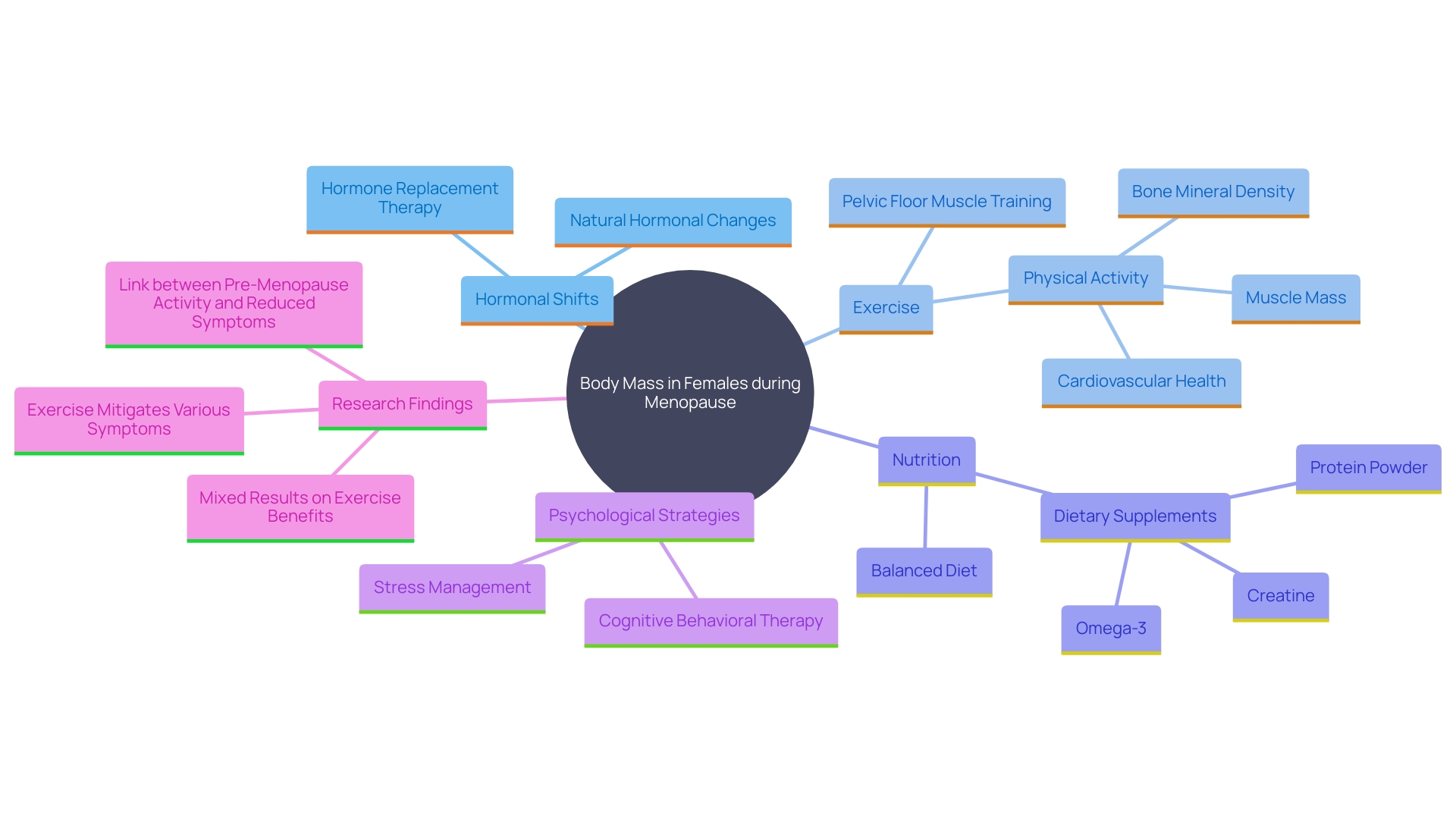
Recommended Diets for Seniors
Multiple eating plans have demonstrated potential for reducing body mass in women over 60. The Mediterranean eating plan, abundant in fruits, vegetables, whole grains, lean proteins, and nutritious fats such as extra virgin olive oil, promotes cardiovascular well-being and weight control. This nutritional plan also includes moderate intake of fish, poultry, dairy, eggs, and alcohol, and rare consumption of meats, sweets, and processed foods. Research highlights the positive impact of the Mediterranean eating pattern, showing its ability to improve various health markers, including metabolism, inflammation, and insulin resistance.
'The DASH eating plan, designed to combat hypertension, emphasizes nutrient-rich foods and can also aid in weight loss.'. It encourages the consumption of vegetables, fruits, whole grains, and lean proteins, while limiting red meat, sweets, sugary beverages, and sodium. Research has indicated that both the Mediterranean and DASH eating plans slow cognitive decline, lower the risk for dementia, and reduce related brain damage compared to Western eating patterns high in red meat, saturated fats, and sugar.
Public wellness strategies should encourage the beneficial aspects of these eating plans and dissuade harmful modifications. Following these balanced eating patterns can lead to sustainable long-term benefits, making them excellent choices for older adults.
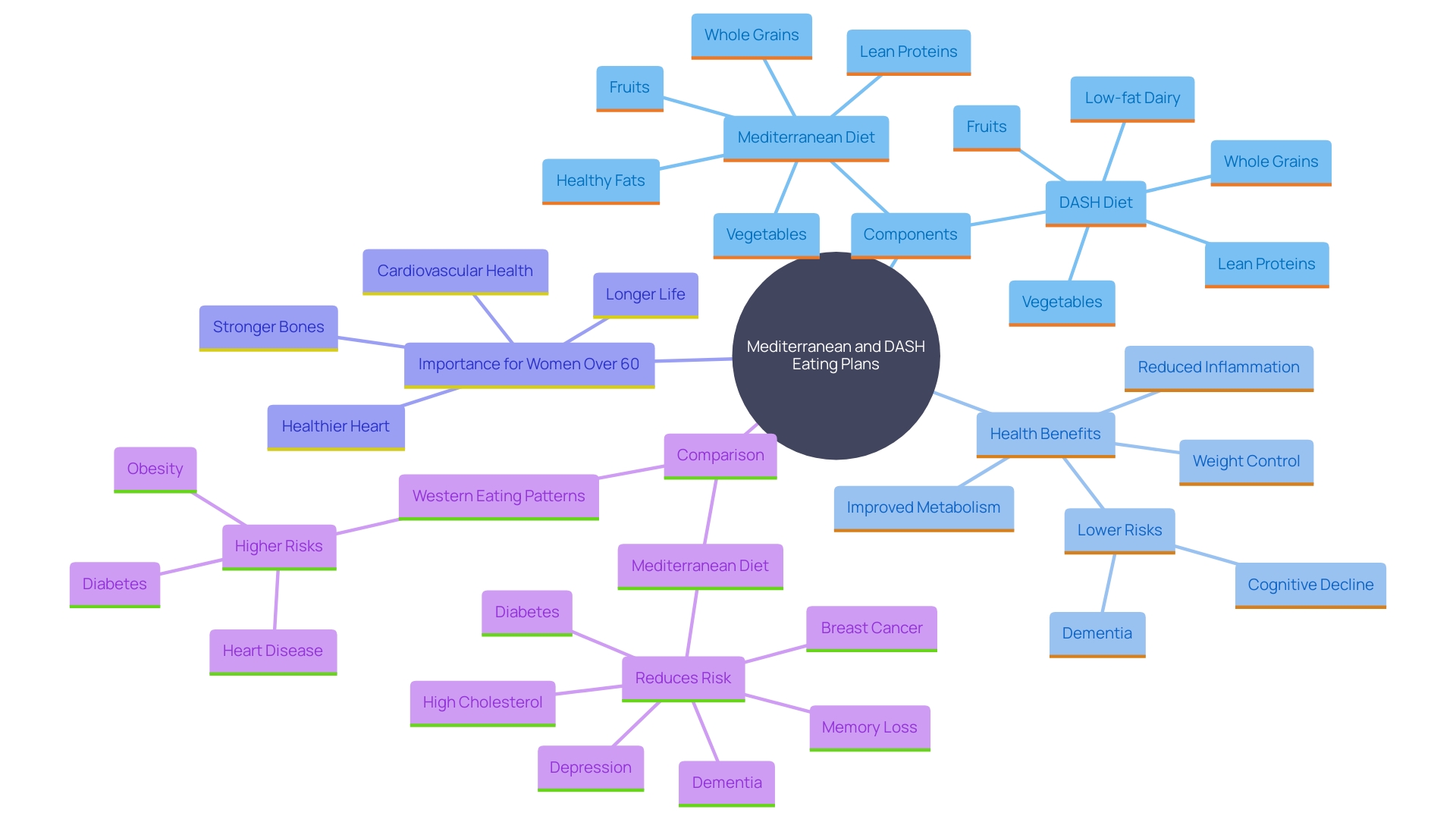
The Importance of High-Protein Diets for Older Adults
Protein is crucial for preserving muscle mass, which significantly impacts metabolism and overall health. For individuals over 60, incorporating high-protein foods into their diet can assist in preserving lean body mass and enhancing feelings of fullness, decreasing the likelihood of overeating. Research from the Nurses' Health Study emphasizes the advantages of plant-based proteins, indicating that individuals who consumed more plant proteins were 46% more likely to maintain health as they aged, in contrast to those who consumed more animal proteins, who experienced a 6% decline in healthy aging.
To meet daily protein requirements, women over 60 should prioritize foods such as lentils, beans, nuts, seeds, and soy products. Notably, one cup of cooked beans or lentils can provide a substantial amount of protein. Including these foods can result in enhanced cardiovascular well-being, reduced LDL cholesterol levels, and better mental well-being. While lean meats, fish, eggs, and dairy products are also valuable protein sources, balancing them with plant-based options may offer more comprehensive health benefits.
Dr. Kathryn Lindley of Vanderbilt University Medical Center observes that individuals consuming more plant proteins might also gain from healthier overall diets and lifestyles, contributing to their longevity and well-being. Therefore, focusing on a variety of high-protein foods can play a pivotal role in supporting healthy aging and reducing the risk of chronic diseases.
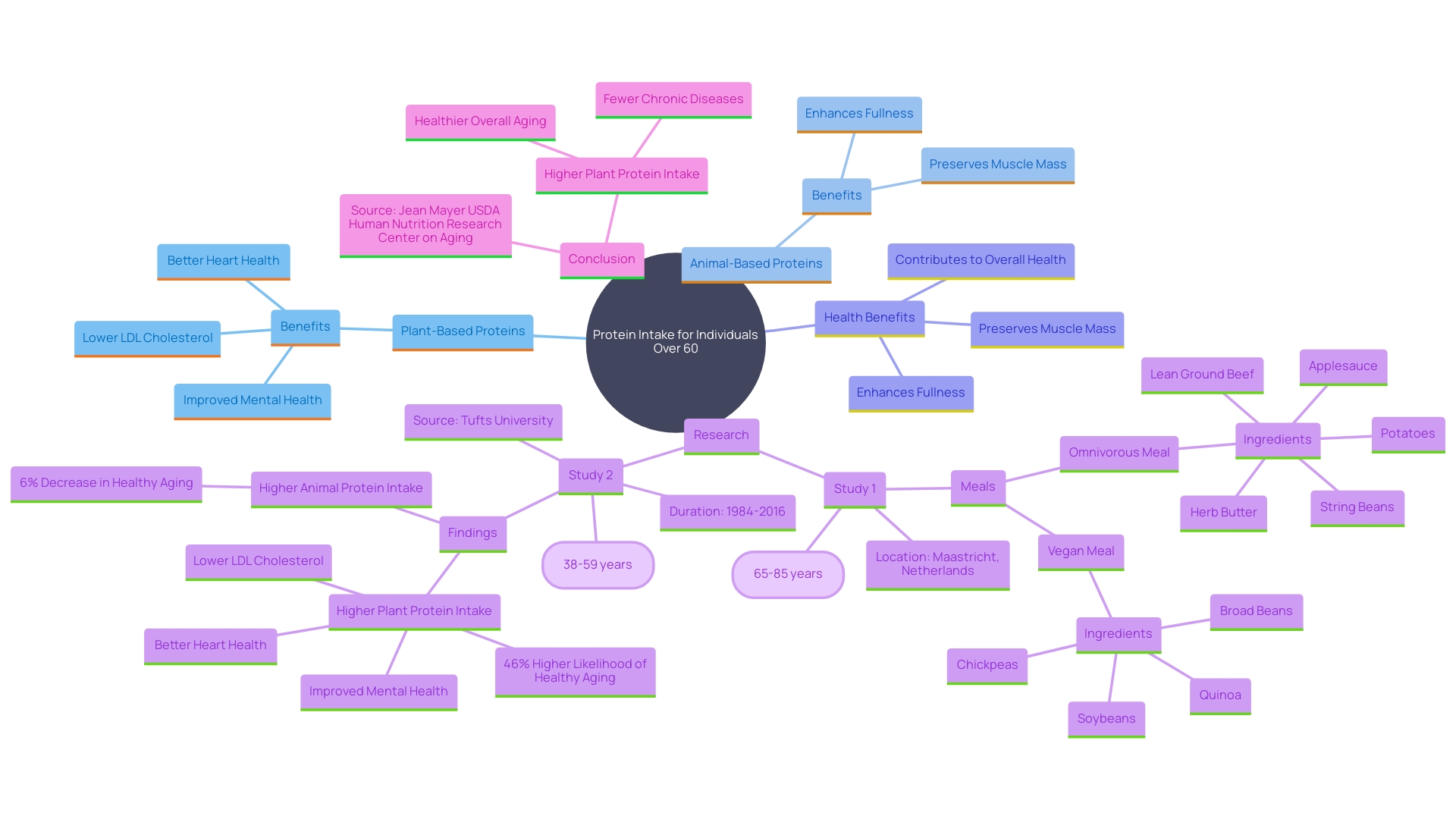
Tips for Successful Weight Loss in Women Over 60
Achieving successful reduction in body mass for individuals over 60 necessitates a comprehensive strategy that encompasses nutritious eating, physical exercise, and lifestyle changes. As women grow older, hormonal changes during menopause can result in an increase in mass, especially around the midsection, with an estimated rise of about 1.5 pounds per year. This is compounded by a natural decline in muscle mass, which slows metabolism, and reduced energy levels that may decrease physical activity.
Meal prepping is an effective strategy to manage portions and reduce unhealthy snacking, helping to maintain a balanced diet. Incorporating strength training into the routine is crucial as it helps build muscle, counteracting the muscle mass loss that occurs with age and boosting metabolism. Regular exercise, including strength and endurance training, supports bone density and reduces the risk of age-related conditions like cardiovascular disease and osteoporosis. Lisa R. Young, a registered dietitian and adjunct professor of nutrition, emphasizes that muscle loss leads to a slower metabolism, making maintenance of body mass more challenging.
Hydration and adequate sleep are also key components of a successful body fat reduction plan. Maintaining hydration helps with digestion and general body function, while adequate sleep promotes hormonal balance and recovery, both vital for managing body mass and overall health. By concentrating on these thorough wellness strategies, individuals over 60 can effectively manage their weight and enhance their quality of life.
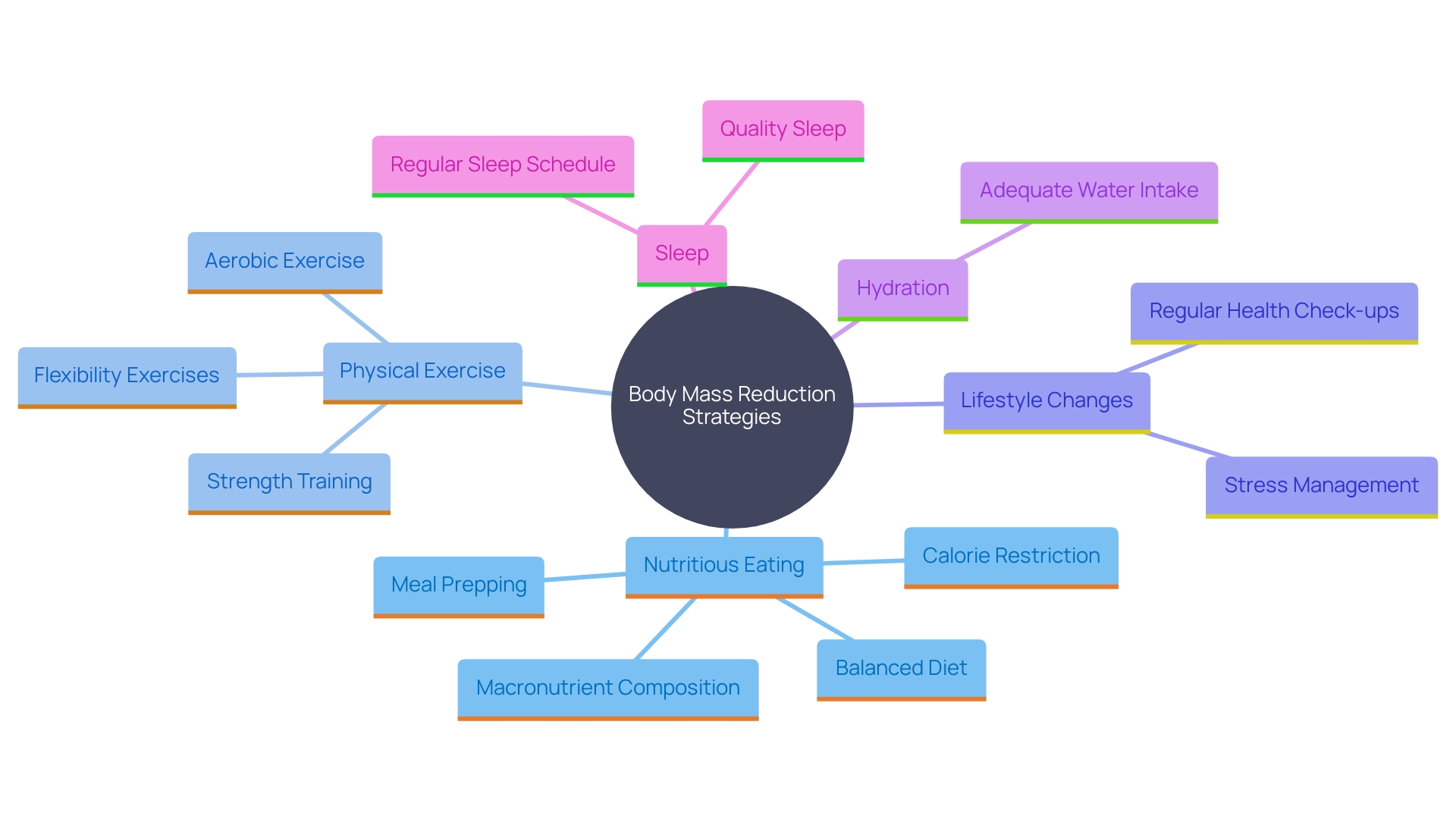
Common Mistakes to Avoid in Weight Loss Diets for Seniors
For women over 60, avoiding extreme dieting and restrictive eating is crucial as these practices can lead to nutrient deficiencies and reduced energy levels. Studies emphasize the significance of sustaining a well-rounded meal plan abundant in vital nutrients to promote overall well-being. For instance, the DASH (Dietary Approaches to Stop Hypertension) plan, praised for emphasizing fruits, vegetables, whole grains, low-fat dairy, and lean proteins, is beneficial for heart health and managing weight. Instead of skipping meals and relying on fad diets, it's more effective to focus on varied, nutrient-dense foods. Research indicates that merging a nutritional supplementation strategy with consistent strength and endurance workouts can greatly aid females during menopause. Furthermore, raising protein consumption is essential for maintaining muscle mass, sustaining strength, and supporting bone condition, particularly as the body's ability to process protein diminishes with age. By prioritizing a well-rounded diet and regular physical activity, women over 60 can achieve sustainable weight management and improved health outcomes.
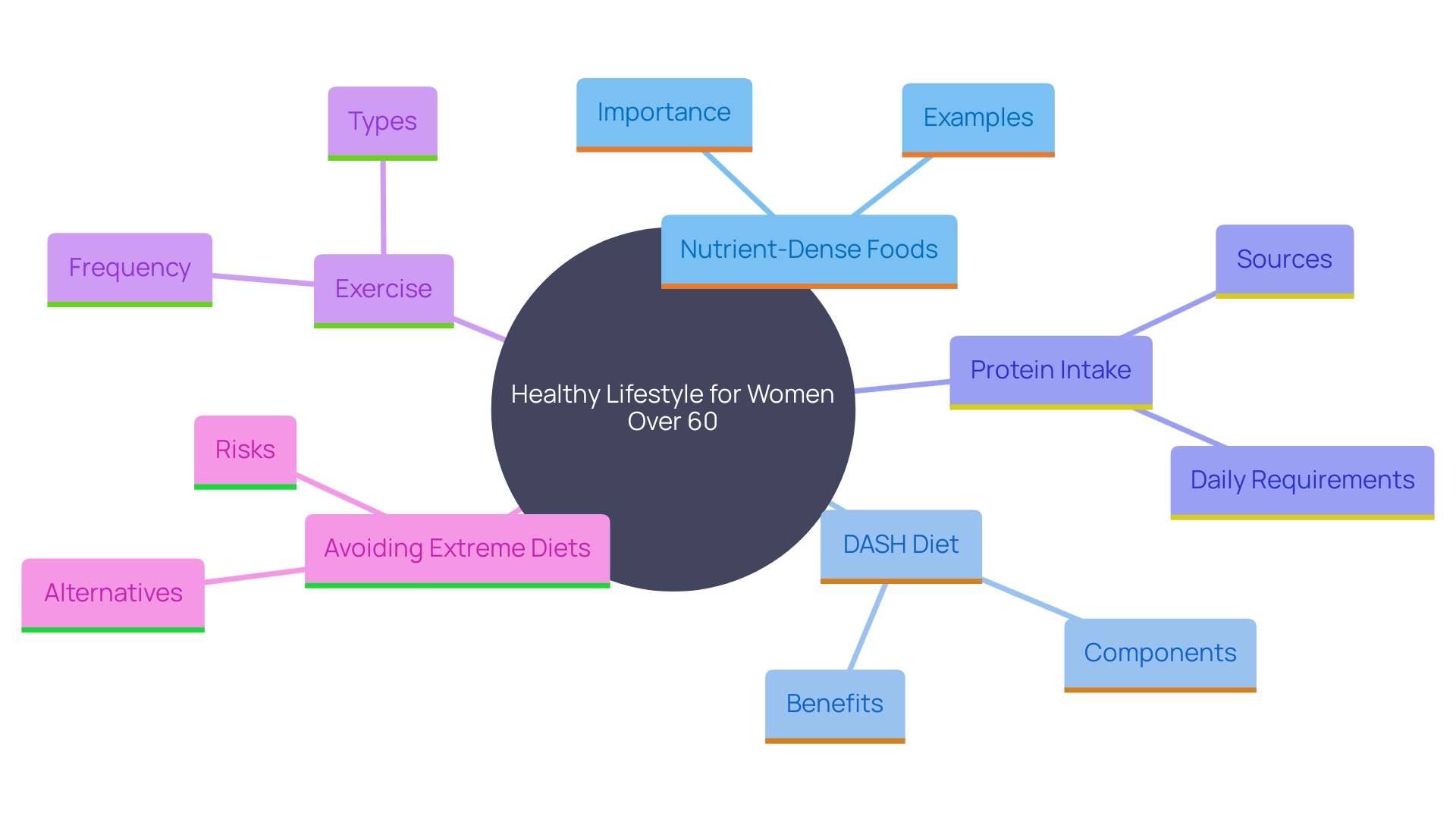
Conclusion
The journey of weight loss for women over 60 is complex, yet achievable with the right strategies in place. Emphasizing a holistic approach that combines nutritional supplementation with regular exercise can significantly enhance weight management efforts while also alleviating menopausal symptoms. Understanding the changes that occur with aging, such as hormonal shifts and decreased muscle mass, is crucial for developing effective weight loss plans tailored to individual needs.
Diets such as the Mediterranean and DASH have proven beneficial, not just for weight loss but also for promoting overall health. These diets encourage the consumption of nutrient-rich foods while limiting harmful options, supporting heart health and cognitive function. Additionally, incorporating high-protein foods, particularly plant-based proteins, can help maintain lean muscle mass and promote satiety, which is vital for effective weight management.
Successful weight loss requires avoiding common pitfalls, such as extreme dieting and restrictive eating, which can lead to nutrient deficiencies. Instead, focusing on balanced, nutrient-dense meals, staying hydrated, and ensuring adequate sleep are essential components of a sustainable weight loss plan. By embracing these strategies, women can navigate the challenges of aging and menopause, ultimately leading to improved well-being and a healthier lifestyle.




